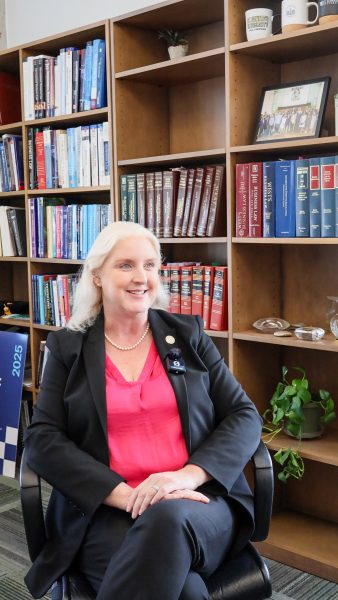U.S. healthcare system dysfunctional, expert says
America has a dysfunctional healthcare market in which prices for medication are too high and health insurance is too expensive, according to an expert in bioethics.
Ana S. Iltis, who is the director for Bioethics and an associate professor of philosophy at Wake Forest University, visited St. Edward’s University on Oct. 27 to give a lecture entitled “Money Madness in Medicine,” as part of the Food and Philosophy Ethics series.
Iltis discussed two main examples that express problems in the American healthcare market. The first issue she discussed is Provenge, a treatment for cancer patients that prolongs life for four months and costs almost $100,000. The second is about the drug Avastin, which is prescribed to cure breast cancer and is covered by Medicare, yet has been proven to not cure cancer and actually harms patients.
The first example, Provenge, is a new treatment for patients with metastatic prostate cancer. Each treatment is unique because Provenge stimulates an individual’s immune system. This means that to make Provenge, the patient’s immune cells must be taken out, sent to a lab, mixed with other ingredients and then given back to the patient.
Provenge costs $93,000—and Medicare agreed to cover the cost. According to Iltis, when Medicare agreed to cover Provenge, people were shocked.
“They think this is madness,” Iltis said.
Centers for Medicare and Medicaid Services (CMS) launched a national coverage analysis to decide whether or not Medicare should pay. Iltis said that people were outraged because taxpayers pay all this money to prolong life, but the treatment can only guarantee prolonging life by four months.
When Medicare makes a decision as to whether or not to cover the cost of a drug, they only consider whether or not the drug does what it is supposed to do. In the case of Provenge, it does prolong life for four months, as it claimed. Medicare is not allowed to ask whether or not the cost of the drug is worth the effects that it causes.
Iltis said the more important question in this case is, “is postponing death for four months worth nearly $100,000?”
The main problem, according to Iltis, is that when someone else pays, you let them; one party is protected from risk by another party. What often causes this is “political hazard,” which is when politicians promise things that they know voters want; they make promises to a lot of people, while others have to bear the burden.
“Of course it makes sense to take a $93,000 drug when someone else pays,” Iltis said.
Iltis said politicians allow drug companies to sell medication at whatever price they want, knowing that the people need it and that the market is failing because it is weak.
Iltis’ second example was a drug called Avastin, which is said to cure breast cancer. However, after being tested, the data revealed that Avastin did not help breast cancer patients and is actually harmful to people, yet it is still being sold, and Medicare agreed to cover the cost.
A market in which some people have too much authority over others is not a market, Iltis said. People have very high expectations at the taxpayer’s expense.
“As long as physicians want to prescribe it, which they do, and people want it, which they do, people have to pay for it,” she said.
Health insurance is expensive because the market is dysfunctional, Iltis said. About one third of all Americans receive healthcare from the government, leaving politicians with a lot of people to please.
In addition, in 2007, 47 million Americans lacked health insurance. Many people would rather save the money or don’t see the need in paying so much for coverage that they don’t see necessary, Iltis said.
The main reason Iltis had for such high insurance prices is the failure to ask the right people the right questions. Not all medications are worth $93,000. The question, “Is it worth it?” needs to be asked more often.
Iltis admitted that she does not know how to fix the market, but it is important that the country first acknowledges that there is a problem in order to find a way to fix it.
“Until we learn to connect cost and value, we will not have a functioning market,” she said.
Students who attended the lecture thought Iltis made some important points.
“I thought what Dr. Iltis had to say was very well explained,” freshman Caitlin Maples said. “There is a dual mindset that when you make something useful people want to take it from you for free. That really is the






